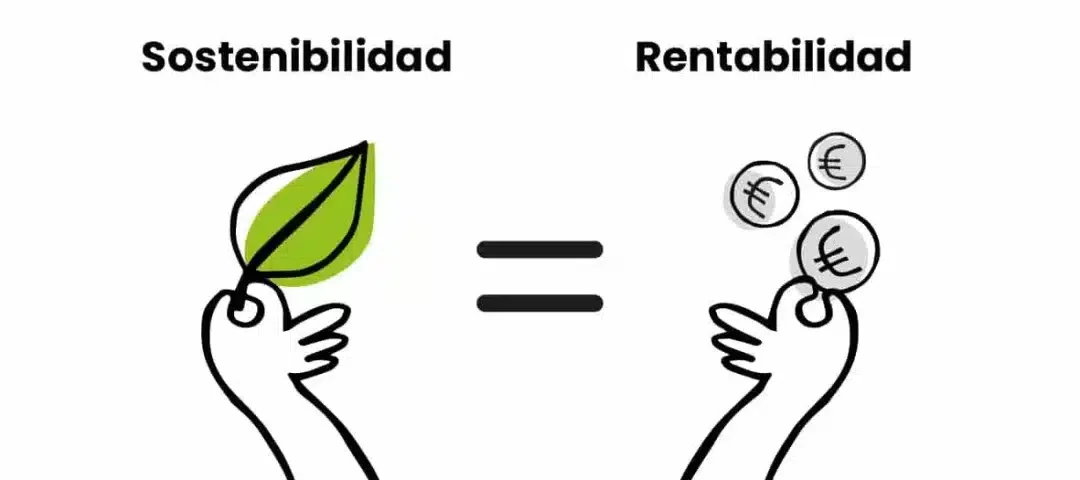Many companies in Spain still believe the myth that “being sustainable is not profitable”. A decade ago, this might have been true, but today it is not.
Here is one concrete piece of data to support this claim-a recent report estimates that Spanish companies using fleets of electric vehicles save between 2,000 and 3,000 euros per vehicle per year. If we take as an example SEUR’s recent acquisition of 200 100% electric cargo vans, we can estimate that this will produce annual savings of between 400,000 and 600,000 euros.
So why do managers still think that sustainability is not profitable? There are three main reasons:
- They only make short-term cost calculations and do not consider the long-term impact of sustainability.
- They do not know how to measure the return on investment of their sustainability projects.
- They are unaware of the internal and external factors that are impacted by a sustainable conscience.
Having a sustainable conscience, based on environmentally responsible actions, is a competitive advantage especially for companies in Europe, which are required by law to reduce their carbon emissions.
Although being sustainable requires an economic investment, just as it does for any type of innovation (and that is not why we stop doing it). That investment will not only be more profitable in the future in terms of cost-benefit, but also in the reputation, branding, and talent attraction that come from being a sustainable company.
In this article we will delve into the reasons why sustainability is profitable and, perhaps then, we can have a discussion based on hard facts rather than outdated beliefs.
They trust us




What does it mean to be sustainable?
The first thing is to define what we mean by sustainability.
In 1987, the United Nations defined sustainability as that which allows “meeting the needs of the present without compromising the ability of future generations to meet their own needs.”
The climate crisis has been exacerbated since that definition in 1987, making it even more urgent that we take action to save the planet.
Being sustainable means making decisions today with tomorrow in mind. When the needs of the present seem to conflict with a sustainable future, we must innovate, use creative solutions and take calculated risks.

Why is sustainability profitable?
Let’s look at seven reasons why it makes sense to achieve greater profitability through sustainability.
1. Reduces energy expenditure and the amount of waste in production.
Sustainable practices lead to savings in resources such as electricity, water, coal, as well as materials and waste during production.
These sustainability practices, such as water saving, energy conservation, digitalization of manual processes and the use of zero-emission vehicles, among others, result in:
- A reduction of the carbon footprint.
- Greater energy efficiency.
- Savings in operating costs.
2. Improves brand perception
The new generation of consumers has a very high environmental awareness. That is why companies must pay attention to sustainability and to making their products and services eco-friendly.
Today, sustainability influences 60% of Spaniards’ purchasing decisions and is a key differentiator in companies‘ overall value proposition. In fact, large companies such as Patagonia, Wholefoods and Unilever have reaped rewards by differentiating themselves in the marketplace as companies committed to sustainability.
3. Attracts investors
Today, sustainability is the innovation driver for many startups. In Europe, although many start-ups have suddenly slowed down funding rounds, investor confidence in Climate Tech and Clean Energies has remained stable.
The size of the continent’s climate technology ecosystem is estimated at €104bn and, according to Dealroom’s analysis, has doubled in value since 2020. Eleven of Europe’s 16 Climate Tech unicorns were created during 2021. Electrification, carbon removal and “sequestration” and supply chain traceability are areas where investors have their eyes.
4. Increases profits
A joint report by Accenture and the World Economic Forum shows that companies that incorporate effective sustainable practices are 20% more profitable than the average company that does not.
Sustainable strategies can increase revenues, reduce operating costs and provide access to lower interest rates. It is estimated that the growing demand for net zero offerings could generate revenues of more than €12 billion per year in sectors such as retail, transportation and construction, among others.
According to McKinsey research, sustainability enables a higher return on capital in 5 ways:

- Improved revenues
- Cost reduction
- Minimization of legal interventions
- Increased staff productivity
- Investment optimization
For example, Unilever revealed that its sustainable products grew 46% faster than the rest of its products.
5. Attract and retain talent
Companies with a sustainable conscience tend to be more productive, attract young talent and retain employees longer.
In 2018, the Workplace Confidence Index prepared by PageGroup noted that for 87.6% of respondents, working for a socially responsible company is one of the key factors when choosing a new job.
6. The supplier and supply chain requires sustainable practices.
Many companies refuse to work with companies that are not sustainable. The commitment to sustainability extends to suppliers and allied companies having the same environmental awareness.
How German IT giant SAP puts it: A sustainable supply chain is one that fully integrates responsible ethical and environmental practices into a competitive and successful model. End-to-end supply chain transparency is critical; sustainability initiatives must extend from raw material sourcing to logistics and even product return and recycling processes.”
7. Enables regulatory compliance
As mentioned above, new regulations in Europe and particularly in Spain require companies to participate and implement concrete plans to reduce their carbon footprint.
The Climate Change and Energy Transition Lawwhich came into force in Spain in May 2021, positioned sustainable mobility as a key sector and set the objective of a fleet of passenger cars and light commercial vehicles with no direct CO2 emissions by 2050, gradually reducing their emissions to 0 g CO2/km by 2040.

The Sustainable Mobility Law, which will come into force in 2023, will bring with it the implementation of Low Emission Zones in towns with more than 50,000 inhabitants throughout Spain. However, since March 21, 2022 with the entry into force of the reform of the Traffic Law, not allowing access to Low Emission Zones constitutes a serious infringement and carries a fine of 200 euros per vehicle. Compliance with the law will avoid penalties for companies operating commercial vehicle fleets.
Sustainability: a more profitable future
As technology advances and the development of infrastructures that promote sustainability accelerates, we will see even more savings and opportunities to make our businesses more profitable.
From PandaGo, true to our mission to make it easier for any company to adopt electric mobility solutions for its activity and employees, we have developed a calculator that estimates the annual savings in fuel costs that companies can achieve by replacing combustion vehicles with equivalent electric vehicles. Download our free calculator and move towards a more sustainable and profitable future.





